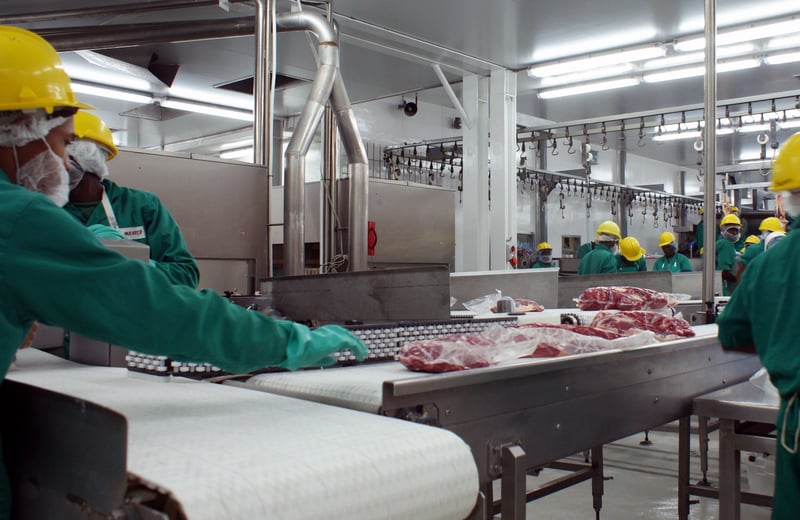
The meat industry is failing to protect workers and animals. Here’s how you can help.
The COVID-19 pandemic is revealing just how vulnerable our food system is, exposing the exploitation of meat processing workers and farmed animals. To date, more than 5,000 workers have tested positive for the virus, and hundreds have already died. Making matters worse, there have been recent reports of several big meat companies failing to provide masks to workers, some of whom said they were told to keep working in crowded plants.
Working at a factory farm or meat processing plant is grueling and dangerous. The Bureau of Labor Statistics names meatpacking as one of the nation’s most dangerous occupations. Workers are denied breaks and forced to work in filthy conditions. What’s more, with slaughter line speeds twice as fast as they were forty years ago, the stress of repetitive cutting motions often leads to serious injury or death.
To ensure accuracy and that animals are properly slaughtered at these high speeds requires that workers stand close together. This increases the risk of the spread of COVID-19 among workers, and without proper protective equipment, they are bound to get sick. With meatpacking being so dangerous, it shouldn’t come as a surprise that many who take to this work are immigrants just looking for a job.
But the abuse and exploitation by the factory farming industry doesn’t stop there. Of the more than 70 billion animals farmed annually, 50 billion of them spend their lives on factory farms. They are treated more like machines than living, breathing, feeling animals. They endure short, miserable lives and are often confined together in cages, crates, or pens, which prevents them from engaging in natural behavior. These animals are treated as cogs in a machine, existing merely for profit.
Furthermore, factory farms are hotbeds of bacteria—to combat this, the Big Ag is infamous for its overuse of antibiotics. In turn, this has led to the rise of drug-resistant bacteria, which poses an immediate threat to workers and an existential threat to all of mankind.
To show solidarity for these workers who are putting their lives at risk, World Animal Protection is teaming up with the League of United Latin American Citizens, the largest and oldest Hispanic Organization in the United States, in urging all Americans to participate in Meatless May. Joe Henry, president of Latinos United of Iowa LULAC Council 307 said, “The campaign is focused on protecting our essential workers and our national food supply.”
It’s critical that the meat industry takes immediate steps to protect workers on the frontline and increase standards of care for farmed animals. In doing so, we can create a kinder and more secure food system.
So what are you waiting for? Take World Animal Protection’s pledge to eat less meat and participate in the Meatless May campaign. The meat industry is powerful, and it’s going to take all of us to move them to do the right thing for animals and workers.